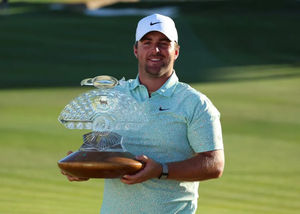Why A Gut-Wrenching St. Totteringham's Day Could Be Just What Tottenham Needed
 Photo via [object Object]
Photo via [object Object] St. Totteringham’s Day, that annual spring tradition where Arsenal celebrate the moment they’ve definitively affixed local blood rivals Tottenham firmly in their league table rearview mirror for good. It is an achievement almost assumed by birthright at this point, like the Patriots winning the AFC East, valued as a worthy goal but also one that, barring an incredible confluence of events overturning the economic and psychological disadvantages that chain back the white part of North London like a leash, is considered the absolute minimum for an Arsenal season to be considered successful.
On its face, then, this season isn’t so different from the 20 that came before it. On what was supposed to be the final day of the Premier League season (and which actually wasn’t thanks to what at first seemed a horrific near-tragedy in Manchester that was thankfully eventually revealed to be a quite funny mishap), Arsenal beat Aston Villa 4-0 while Tottenham got blown out by Newcastle 5-1. This meant the Gunners had just squeaked by Spurs to finish second in the table to their rival’s third. What had threatened to be the first St. Totteringham’s Day-free year since 1995 instead became another like all the others.
This was, without a doubt, embarrassing. We have called Tottenham the best team in the league this season; such was their combination of legitimate talent throughout the squad, consistency in results and performances, and their indomitable, ruthless, deeply-ingrained playing style in a league curiously bereft of tactical rigor. In the season of little old Leicester City, and the stagnation and complacency among the handful of usual title contenders that allowed Leicester’s fairytale to come true, Tottenham were the one big team that could look back at their season with pride for their achievements and hope for what those achievements augured for the future. Spurs’ smart recruitment and development and coaching fared better against Leicester’s cosmically ordained championship charge than did all the riches of Chelsea, the two Manchester clubs, and Arsenal.
Nonetheless, it felt to some degree like Arsenal, by tracking down the previously ascendent Tottenham, had ultimately won the battle of North London. Arsène Wenger was pleased he could mollify his forever-agitated fan base at least a bit with these bragging rights, at least one player saw fit to rub Spurs’ nose in it, and Tottenham fans had to suffer a final, eminently Spursy humiliation in what for so long looked like their special season. Tottenham manager Mauricio Pochettino himself could barely tamp down on the rage seething beneath, as he made clear by slamming the club’s collective mindset in his comments after the game:
“Very disappointed. Very disappointed. Because our fans don’t deserve [this]. Our families don’t deserve [this]. It’s difficult to go tonight and see my boys, my wife. I think it’s unbelievable. Unbelievable.” The guy is literally saying his team should be too ashamed to look their wives and girlfriends in the eyes after their collapse in this game and the ones following the decisive, dream-killing result against Chelsea two weeks ago. This is obviously very serious to him.
The interviewer, no doubt feeling Pochettino’s visceral frustration and trying to pivot to the greater season-wide arc of what has been an amazing season, goes on to ask the manager whether the broader scope of the campaign should be enough to overlook what was a disappointing though ostensibly meaningless stumble at the end. Pochettino refuses the chance to cast this as a slight dip along the larger continuum of success. He admits that the club’s preseason goals were to finish in the top four, which they have, but intimates that he noticed some important flaw in those last few games that prevent him from writing it off as a blip. “For me, it’s the worst day as a manager.” It’s the club’s mentality he keeps going back to. That’s what he thinks needs to be changed.
Tottenham for so long have been defined by an inferiority complex and a penchant for high-profile humiliations. Simply by finishing third, being the final challenger for the title before the winner was ultimately crowned, cultivating an exciting and quality-rich and young squad that does not appear to be in any serious threat of being dismantled in the short- to medium-term, and postponing St. Totteringham’s Day until the final day of the season, Spurs could with quite some justification regard their season as a nigh-unmitigated triumph. But Pochettino seems to be sending a message to his team and the rest of the world in that interview above: We can and should be even better than this.
Compare that mindset with Arsenal’s. While their second-place finish is their highest table position in 11 years, and their unanticipated St. Totteringham’s Day celebration a nice present to end the season with, the Gunners should rue the missed opportunity of this season unlike any of the others in their EPL title drought. If any year was Arsenal’s year, it was this one. Every Premier League club bigger than them suffered either an outright disaster of a season or something close to it. Meanwhile the Gunners were cash-flush, armed with an unquestionably great cast of characters, and had only Leicester City and their little brothers across town to beat. Instead they limped out of the race before the two smaller clubs, and yet seem more content with extending the cute but empty streak over Tottenham than determined to solve the problems that prevented them from becoming champions.
Tottenham and Arsenal are both well-placed for the coming season. They’ll probably keep everyone worth keeping, have the money to shore up their weak spots, and will benefit from the continuity of their respective adroit and gifted managers. What may end up mattering more than all of that, though, is which team goes into next season angry about how this one ended, and which team goes in satisfied.
Why Alabama vs. Ohio State Must Happen as Scheduled
The NBA’s Tanking Problem Is Getting Worse — Not Better
NBA Picks Tonight: Three Best Bets Before the All-Star Break
- Best NBA Betting Picks for Wednesday Feb. 11th Slate
- Early Super Bowl LXI Odds Favor Seahawks, Sleeper Betting Picks & More
- Sunday Feb 8th NBA Picks: Three Best Bets Today
- Super Bowl Betting Preview: Seahawks vs. Patriots Breakdown & Pick
- The Most Fun Super Bowl Prop Bets You Can Make This Year
- Super Bowl 60 Prop Bets: 10 Best Bets for Patriots vs. Seahawks
- UFC Fight Night at the Apex Best Betting Picks and Predictions












